 The University of Chicago Magazine October 1995
The University of Chicago Magazine October 1995
Return to October 1995 Table of Contents
INVESTIGATIONS
Michael Milken did no wrong and--surprise--much good, says Daniel Fischel.
Also in "Investigations": At the International Joint Conference on Artificial Intelligence second-place finish went to, Chip. Prasenjit Duara's Rescuing China from the Nation: Questioning Narratives of Modern China (Chicago) explores history as a series of conflicting narratives. Can dissertation skills be taught? Why are insects and vertebrates mirror images? And researchers model the physics of granular materials.
Find yourself another villain, says Daniel Fischel. Michael Milken did
no wrong and--surprise--much good.
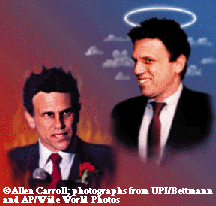 The two faces of Mike: Was Milken a ruthless vulture or an innocent scapegoat?
The two faces of Mike: Was Milken a ruthless vulture or an innocent scapegoat?
He's among the most vilified Wall Street icons from the decade of greed
but, to law professor Daniel Fischel, he's an innocent man. Michael
Milken-junk-bond king and convicted felon, the man who evoked such
fascination that books about him are practically a cottage industry-got a
bum rap, argues Fischel. So, for that matter, did several other important
financiers of the 1980s. And so did the whole "decade of greed."
In Payback: The Conspiracy to Destroy Michael Milken and His
Financial Revolution (HarperBusiness), Fischel springs a number of
surprises: Milken did nothing illegal; he and the junk-bond-financed
takeovers he pioneered were a salve for U.S. business; the plague of
insider trading was a myth; and blame for the savings-and-loan disaster,
pinned on junk bonds and other factors, rests squarely with the
government.
Fischel, JD'77, the Lee and Brena Freeman professor in the Law School,
concedes his book "is definitely swimming upstream." But it's his
qualifications as a writer, he says, that fundamentally distinguish
Payback from other recent Milken books. An economist and lawyer,
Fischel has written academic articles on the corporate practices that made
headlines in Milken's heyday. And, as he's quick to admit in
Payback's introduction, he knows some of players firsthand through
the consulting firm Lexecon Inc., whose clients have included Milken and
Charles Keating-and which Fischel serves as executive vice president.
Faulting journalists for relying on personalities or recollections, he
draws on sources like court transcripts and economic studies but writes for
the layperson-with a view that the New York Times called "about as
subtle as a sledgehammer."
Fischel's first exhibit is Milken's "restructuring revolution"-the
hostile takeovers, leveraged buyouts, and other debt-financed maneuvers
that transformed U.S. corporations. Milken, heading the high-yield bond
division at the investment-banking firm Drexel Burnham Lambert, raised the
use of these so-called "junk" bonds to an art. His deals, coinciding with
factors like deregulation and international competition, writes Fischel,
proved the antidote to overdiversified, unprofitable conglomerates, leading
to a "radical shift in power from managers to shareholders." Companies
either became more efficient in efforts to fend off takeovers, or lost
control in deals that concentrated stock in the hands of the new
owners-leaving managers the choice to pursue profitability or risk losing
their jobs.
In response, the corporate establishment-joined by old-line Wall Street
bankers losing money to the upstart Drexel-worked to sow fear amid the
public. Buyouts were blamed for unemployment, for instance, though Fischel
asserts that similar job cuts happened in companies never party to a
takeover threat. And American business was portrayed as ready to topple
under a mountain of debt, when in fact, says Fischel, a zooming stock
market kept the ratio of debt-to-assets lower in the 1980s than in previous
years.
The status-quo elements in business and finance, claims Fischel, also
found sympathy in a Congress eager for scapegoats for its S&L troubles, and
in prosecutors ready to please the public by pursuing the junk-bond
bogeymen. In particular, Payback blasts U.S. Attorney Rudolph
Giuliani's "reign of terror," not only for his prosecution of Drexel but
for using strong-arm tactics-like the use of powerful racketeering laws
originally intended as weapons against mobsters-on minor Wall Street
figures.
In his version of events, Fischel's toughest sell, he admits, is "the
notion that Michael Milken didn't commit any crimes, even though he pled
guilty to six felonies-that's hard for anybody to accept without learning a
lot more about the background."
Fischel believes that compounding problems, like the spectre of endless
future lawsuits and worries over how his legal troubles were hurting his
family, pushed Milken into a plea bargain over the charges of racketeering
and securities, mail, and wire fraud. Milken also doubted whether a jury
would acquit him-if only for a fact well noted in the 1989 indictment: his
income, which peaked in 1987 at $550 million. The prosecution's
implication, which Fischel feels has substituted for evidence in the
public's mind: No one makes that much money without breaking the
law.
Milken tearfully accepted six of the charges in April 1990, but Fischel
clearly doesn't. Some, he says, "weren't even considered regulatory
violations" before Milken's conviction. Citing as a less complicated
example a stock-purchase disclosure form at issue in one of the charges,
Fischel says that past violations of the "ambiguous" disclosure
requirements were"treated as a civil, regulatory matter." Yet Milken was
"criminally prosecuted-not for filing his own false [disclosure],
but for 'aiding and abetting' somebody else's filing."
The good news, for Fischel, is that sending Milken to prison for two
years didn't undo the changes he wrought. Corporations remain "mean and
lean" compared to their pre-'80s state, and the junk-bond market-despite a
wave of regulations that he calls more government scapegoating-is "a
booming worldwide success story."
So far, Payback has gotten its warmest reception in business
circles. To the Wall Street Journal, it's "a book that may well
change our understanding of the 'decade of greed.'" The New York
Times hedged its praise, noting that sometimes "[Fischel's] sympathies
simply get the best of him."
Those sympathies have led him to a different conclusion about Milken's
downfall than the standard tale of greed and retribution. The moral to this
story isn't about what Michael Milken did, Fischel believes, but how others
reacted, both envious of and mystified by his success. "Once financiers are
perceived to be socially useless scavengers," Fischel warns in the book,
"it's just a short but critical additional step to label them
criminals."-A.C.
Citations
HAL's Forebears.
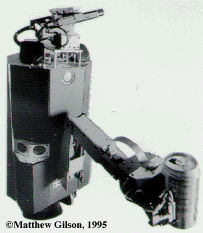
To a robot, just navigating a room full of furniture is
tough. Compared to their dextrous, specialized brethren on assembly lines,
autonomous robots--those built for the complex, unpredictable, real
world--are infants. Charting their progress is an annual contest at the
International Joint Conference on Artificial Intelligence, where, in
August, a second-place finish went to the U of C's entry, Chip. The child
of computer scientists James Firby and Michael Swain, Chip
(Chicago Intelligent Prototype) competed in a recycling task with five
world-class robots at the Montral event. Chip can locate an object by
scanning its edges, identify it as trash or soda can by comparing it to
known models, gauge its distance with stereo vision, negotiate obstacles to
reach it, and find a recycling bin. Child's play? Absolutely, says Firby:
What adults do unthinkingly are "the kind of things that little kids spend
hours and hours learning." (Curious World Wide Web users can spy on Chip
via videocamera at http://vision.cs.uchicago.edu/cgi-bin/labcam.)
Missing History.
When modern nationalism took hold in imperial China,
did historians get the story right? To U of C historian Prasenjit Duara,
their narratives share a flaw endemic to most history: A focus on the
nation-state, portrayed as a single, evolving community, "poised to realize
its destiny in a modern future." In Rescuing China from the Nation:
Questioning Narratives of Modern China (Chicago), Duara explores an
alternative: history as a series of conflicting narratives, which together
reveal how "the past is meaningful to the present."
Step by Step.
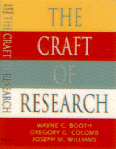
Must a dissertation be a trial by fire, or can the skills
of research be taught? Wayne Booth, AM'47, PhD'50, and Joseph Williams of
Chicago and Gregory Colomb of the U of I draw on their long experience in
The Craft of Research (Chicago), explaining how to gauge an audience, hone
a topic, shape an argument, and draft a report. One aim, they write, is to
illuminate those issues "usually treated as part of a mysterious creative
process."
Our Bugs, Ourselves.
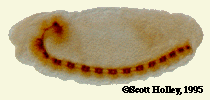
Why are insects and vertebrates mirror images? An
arthropod's nerve cord lies on its belly and its "heart" is on its
back--but is that mere coincidence, the favored answer for almost 200
years? Not at all, say U of C molecular biologist Edwin Ferguson and
colleagues at UCLA and the University of Wisconsin. They report in Nature
that the two growth-directing substances that cause an embryo to develop a
belly and a back are interchangeable between frogs and fruit flies (at
left, stained to show the embryo's central nervous system)--but their roles
are reversed. This common chemistry, say the authors, argues for an
evolutionary explanation: The animal body plan turned upside-down in either
vertebrates or arthropods sometime after they diverged.
Slip Sliding.
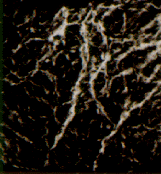
It pours like a liquid, but even mortals can walk on it.
How does a sand pile hold itself up? Researchers have discovered how to
see--and model--the physics of such granular materials. Not all grains are
equal: Each leans unevenly on its neighbors, and some bear more weight,
concentrating the forces. In a container of beads devised to transmit light
under pressure, these "force chains" appear as white lines (see inset). In
Science, Chicago physicists Susan Coppersmith, Sidney Nagel, and Thomas
Witten; Chu-heng Liu, SM'88, PhD'94, now of Exxon Research and Engineering;
David Schecter, AB'94; and Bell Laboratories scientists describe their
work--of interest not just to beachcombers but to industries from mining to
pharmaceuticals.
Go to:
Return to October 1995 Table of Contents

 The University of Chicago Magazine October 1995
The University of Chicago Magazine October 1995
 The two faces of Mike: Was Milken a ruthless vulture or an innocent scapegoat?
The two faces of Mike: Was Milken a ruthless vulture or an innocent scapegoat?

